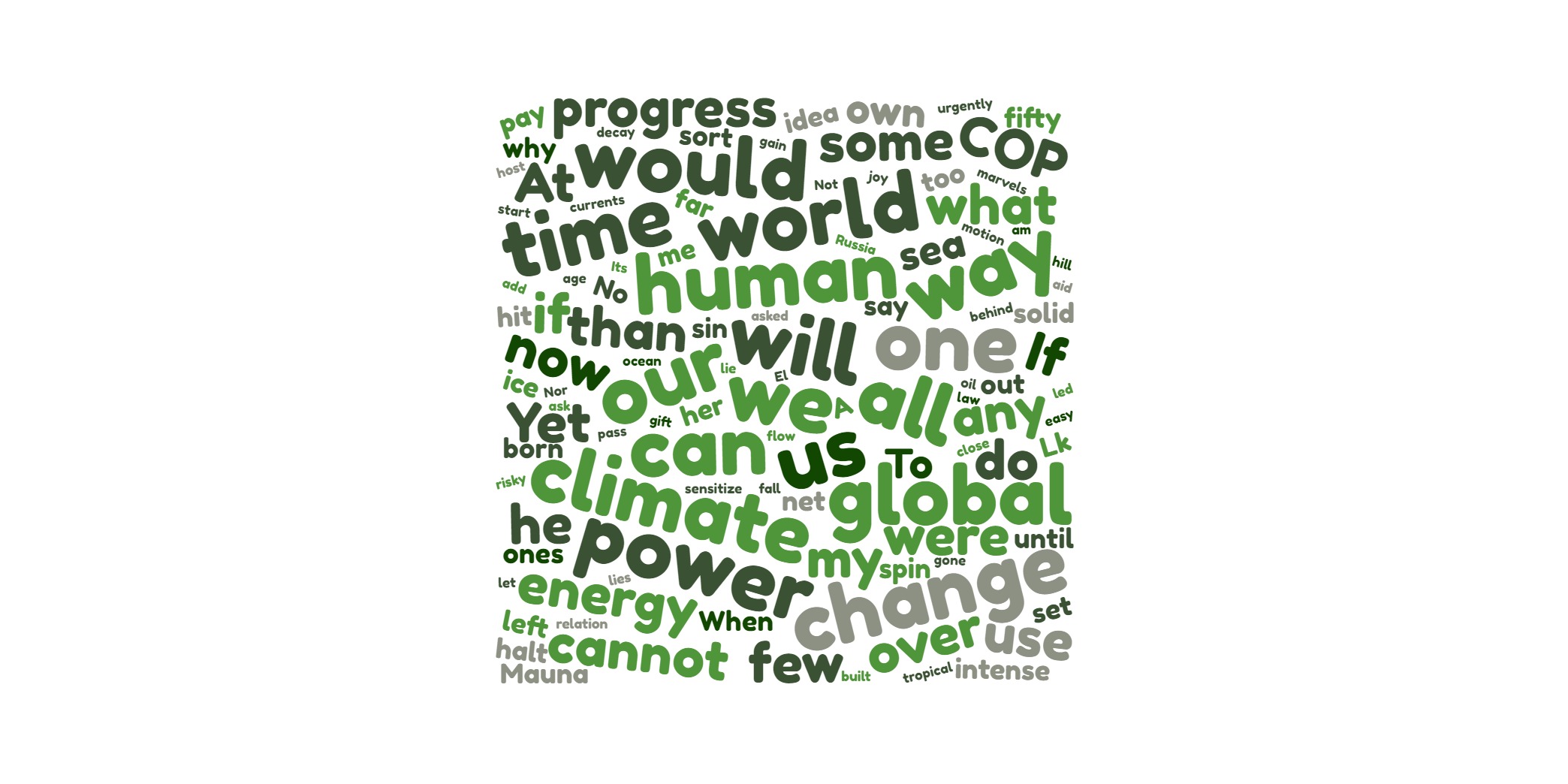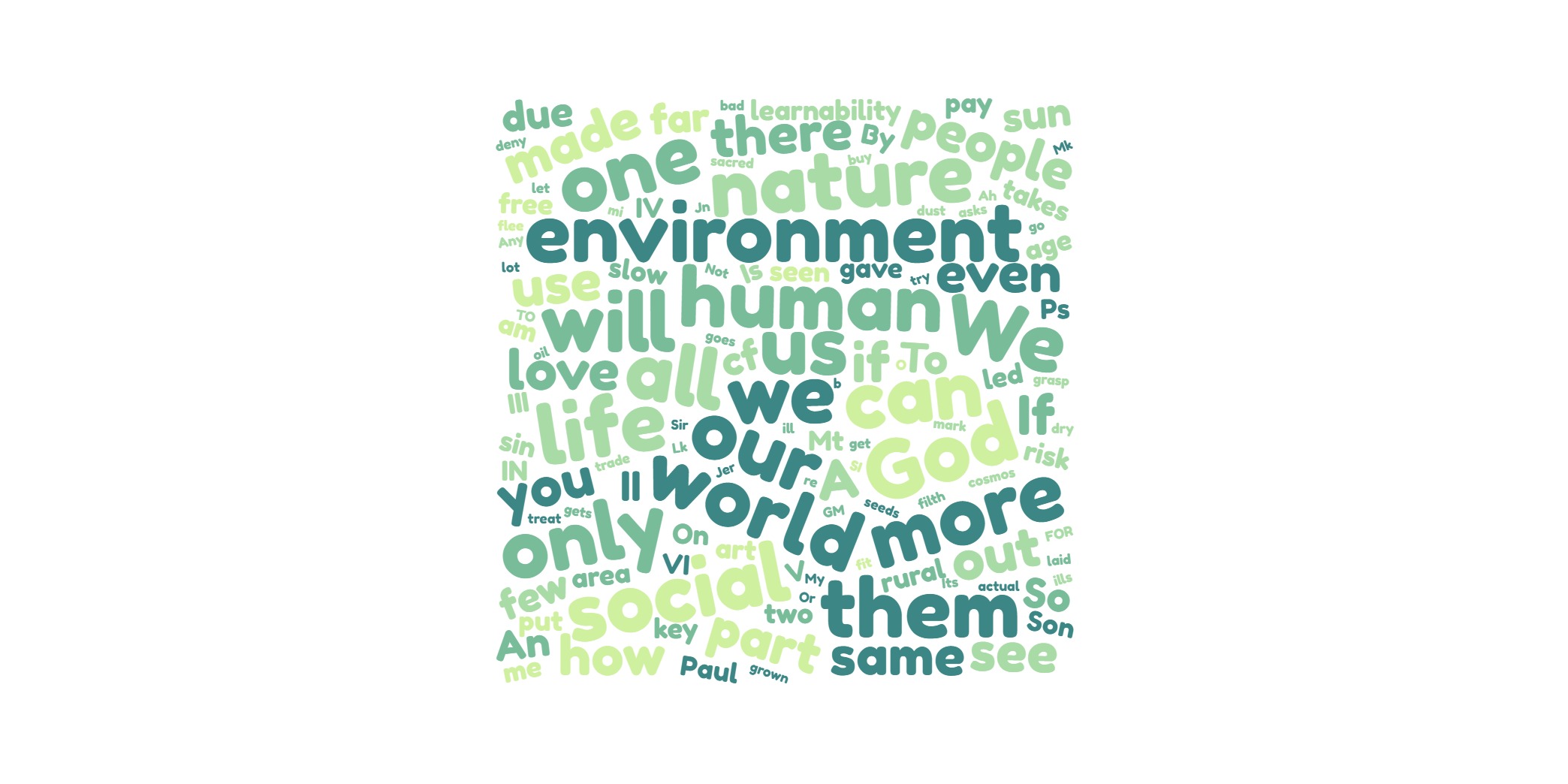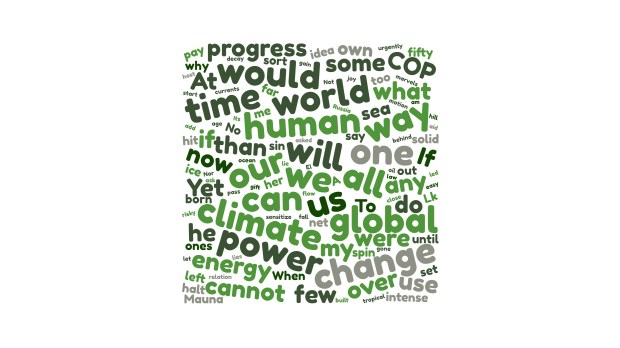“We,” “will,” “human,” and “world” are the words that appear most frequently in Pope Francis’ new apostolic exhortation Laudate Deum, published October 4, 2023. This short text urging decision-makers to act immediately to combat the climate crisis, is in continuation with Pope Francis’ 2015 encyclical on the care for creation, Laudato Si’.
Aleteia has selected, contextualized, and analyzed the most recurring words in this apostolic exhortation, comparing them in particular with those in Laudato Si’.

We, us, our:137 repetitions
Like in Laudato Si’, the most used words in Laudate Deum reference us as a global community as we are the main actors who have to work together to care for our common home and combat climate change. In fact, Laudate Deum is addressed to “all people of good will,” rather than just Catholics. Pope Francis even cites our “brothers and sisters of other religions” to motivate all in caring for the environment, as climate change is a problem that affects everyone.
Will, can, would:80
In Laudate Deum, the words “will,” “can” or “would,” which propose potential actions or evaluate their consequences, are very frequent as Francis analyzes the climate crisis our world is facing. In Laudato Si’ these words are also some of the most used but they come in third place. In fact Laudate Deum is a much more direct appeal for decision-makers to act.
“If we are confident in the capacity of human beings to transcend their petty interests and to think in bigger terms, we can keep hoping that COP28 will allow for a decisive acceleration of energy transition, with effective commitments subject to ongoing monitoring,” the Pope wrote, citing the next United Nations Climate Change Conference (COP), to be held in December 2023.
Human, humanity, beings: 80
Whereas in Laudato Si’ the word “human” and its variants are the second most used terms, in Laudate Deum they come in third place. Like in his encyclical though, Pope Francis warns against “human beings claiming to take God’s place” for that is when “they become their own worst enemies.” He links this thought to the “technocratic paradigm,” which is the “idea of infinite or unlimited growth” with no restrictions or concern for the effects on the world. “We stand naked and exposed in the face of our ever-increasing power, lacking the wherewithal to control it,” the Pope writes.
World, global:53
Like in Laudato Si’, the words “world” and “global” are the fourth most recurring terms in Laudate Deum. “The world in which we live is collapsing and may be nearing the breaking point,” the Pope warns. The global dimension seems to be even more accentuated in Laudate Deum, as the Pope directly writes to the international community, with a section titled “the weakness of international politics.” In fact, he also criticizes an “old multilateralism” that cannot seem to efficiently respond to current issues. “It is necessary to be honest and recognize that the most effective solutions will not come from individual efforts alone, but above all from major political decisions on the national and international level,” the Pope says.
Climate and change:52
While these two terms were not among the most frequent words in Laudato Si’, the issue of climate change is at the heart of this new apostolic exhortation, which addresses in particular the perception of this phenomenon in society and in the Church and the urgent state of environmental matters. “It is indubitable that the impact of climate change will increasingly prejudice the lives and families of many persons,” warns the Pontiff. He describes it once again as one of the major challenges facing humanity, saying this is why the climate emergency calls for a “cultural change.”
More, increase, greater:45
Although also in Laudato Si’s top 10 most used terms, in Laudate Deum the words “more” and its variants are even more prevalent. This is because this apostolic exhortation is a direct appeal and call to action as “we barely have time to prevent even more tragic damage” to the environment. He mentions the situations of both the most privileged and the most disadvantaged countries, considering that the manifestations of climate disruption have become even more visible and frequent.
Time, years: 37
Eight years after Laudato Si’, the Pope states that “with the passage of time, [he has] realized that our responses have not been adequate.”
“Some effects of the climate crisis are already irreversible, at least for several hundred years,” the Pope explains, highlighting the urgency of the situation and the need to act. “We are now unable to halt the enormous damage we have caused.”
Power:21
The Pontiff devotes a large part of his text to denouncing a contemporary obsession for “increasing human power beyond anything imaginable.” He invites us to “rethink” the use of power in the modern world, particularly at the multilateral level, in order to move away from the paradigm of “ever-increasing power.” It is also a recurring word, although less, in Laudato Si’, which shows that this new text is focused greatly on the potential for action that the climate emergency implies for humanity.
Way: 19
The last two most-used terms in Laudate Deum did not figure in Laudato Si’s most frequent words but they still give insight on this new apostolic exhortation. As this text is an active call to action, it is understandable that “way” is one of the most frequent words, as it encourages new measures.
“Let us stop thinking, then, of human beings as autonomous, omnipotent and limitless, and begin to think of ourselves differently, in a humbler but more fruitful way,” the Pope pleas.
Countries: 17
“The reality is that a low, richer percentage of the planet contaminates more than the poorest 50% of the total world population, and that per capita emissions of the richer countries are much greater than those of the poorer ones,” Pope Francis wrote. In Laudate Deum he made a clear distinction between the responsibilities of the countries in the Global South and North when it comes to climate change. He highlighted how the former tend to be more affected by climate change, while the latter tend to pollute much more.
Other key terms and differences with Laudato Si’
Among the other terms that recur regularly are “life”, “energy”, “new” and “COP”, to which the Pontiff dedicates an entire chapter.
Again noting the distinction in audience, the term “God” appears only 11 eleven times in the apostolic exhortation, whereas it was the fourth most frequently used term in Laudato Si’ (with 163 repetitions, although the encylical is a much longer text).
Other terms that were in the top 10 most used terms in Laudato Si’ but are less frequent in Laudate Deum are “environment”, “social” and “nature”, showing that this second text is less contemplative and more focused on immediate action.


